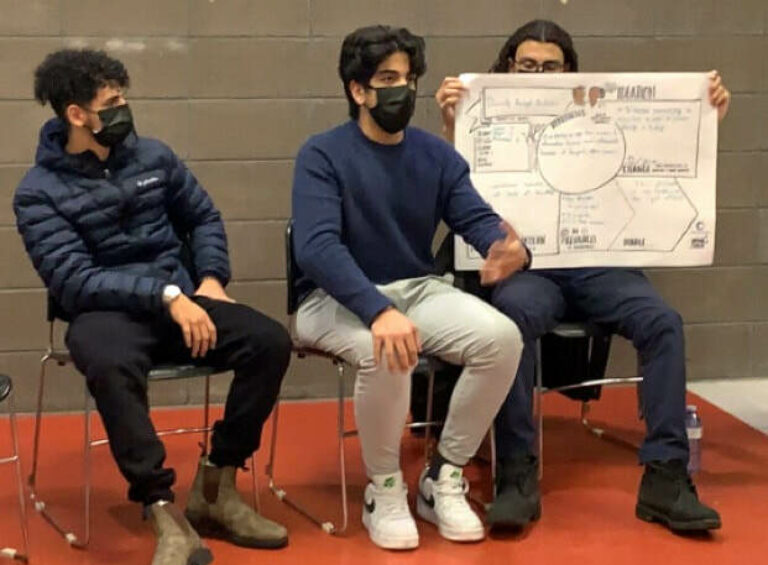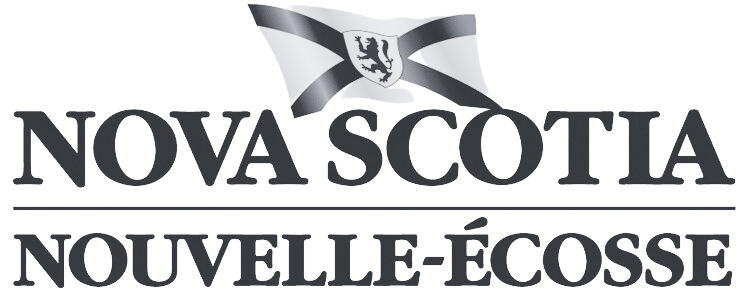Written by Denise Withers
It all started with a text message asking university student Omar Hamdan what he was doing for the weekend.
The next thing he knew, he and his two friends, Naser Ibrahem and Muhammed Bsoul, were jammed in a car with family friend Ahmad Hussein, hurtling down the highway from Halifax to Truro for the first meeting of the Future of Hockey Lab. It was the start of a journey that would change the group's connection to hockey – and perhaps the game itself – forever.
Syed Ahmad, who joined the group later, explains. "I thought it was a really cool idea. I do Tae Kwon Do and Halifax is not a super big centre for that. Yet, when you go to Korea or Iran, those places have some amazing fighters, because they've brought in so much diversity. So I just thought it was a really good idea to find that untapped talent and really bring it out in hockey."

As students, all four have roots in either Palestine or Pakistan where ice hockey doesn't exist. So as youngsters, they never had the chance to play. During that first Lab workshop, they discovered they weren't alone.
"We didn't have the same opportunity as many other Canadians did in the sport of hockey," Naser notes. "After we heard the stories from others, we saw that we could make a difference for younger people growing up."
Syed continues. “So that was something important we were able to bring to the group. We were the kids who could show where there's not enough hockey exposure and add to these areas, so we could grow support and interest from a larger community."
Barriers are often not what we think
As they explored the research the Lab provided about barriers to the sport, the team realized that it was almost impossible for newcomers to find the most basic information about how to get started in hockey. So they decided to build a website to close that gap.
"We do understand what the barriers are really well and exactly how to get around those," Syed points out. "So the website is really going to streamline the process to join hockey and learn more about it." "The idea is to have sections about where to buy gear and sign up for teams, along with a basic overview of the game in general,” adds Naser. “We met an amazing amount of people on our first trip to the Lab, all with different experiences and expertise in the sport of hockey. So we took tips from all of them to include."
They're also collecting information through another Lab project, led in part by Omar's uncle Ahmad, which is introducing 20 Muslim youth to the game. In particular, they did a survey with parents in that program to find out what was stopping their community from getting their kids started in hockey. What they found surprised them.
The biggest barriers weren't information or even cost. For 90% of respondents, it was a cultural gap.
Omar explains. "They said things like, 'I have never heard of hockey before. I've only been here for two years and I don't know what the sport's about, so I'm not putting my kid in it.' And that's normal because people tend to lean towards what they're most comfortable with. So a lot of the kids of immigrants that move to Canada end up in different sports that their parents are more familiar with."
The best ideas keep it small and simple
While Ahmad's project focused on creating positive experiences to address this gap and raise awareness of hockey, the four youth decided to scale their work down to provide the information local Muslim families would need to get started. By keeping their website small and simple, they'd be able to test and learn from their ideas quickly.
Though their work isn't done yet, they've already learned a lot from their time in the Lab, including how to shift the way they approach problem-solving – from needing to get things right the first time – to viewing it as a learning journey.
"For example," Syed explains, "Prototyping as a concept is very broad. And there are many different ways to tackle it. There's no right way as is often taught in school – no correct method or algorithm. You just get some ideas and test them out on a small scale. And if they don't work, then you can adjust it. Or if they do work, you can ramp it up to a higher scale, and then keep going like that."
While it has been hard for the team to feel like they're making progress sometimes, whenever they get frustrated, they're able to draw inspiration from the early impact of the Lab on their community.
A service mindset is key
"What surprised me the most was watching the 20 Muslim kids at the rink on Fridays," Naser smiles. "You could tell they had so much fun! These kids had never heard about hockey before, yet they were still enjoying it so much. That truly made me and the whole team feel really happy about what we've been doing with the FHL."
For Omar, the experience also triggers a twinge of regret. "A lot of times when we're at those practices, we talk between ourselves and wish we had skates to be able to go out with the kids to skate and play with the puck. So I think all of us really would love to go back in time and get into the sport of hockey."
Yet, 18-year-old Naser knows the real story of their work is much bigger.
"It just goes to show that if everyone was given the same opportunity and if everything was fair, so many more people our colour would be in the sport of hockey. Even in the NHL, I recently went to look up how many people of colour are NHL players or how many Muslims there are. And there are hardly any, which was really surprising for me, honestly."
In fact, BIPOC players make up less than 5% of the NHL, something the Lab plans to change.
The sense of loss they each feel begs the question – how many other new Canadians feel the same way – that they've missed their chance to fall in love with hockey? That's why these four youth are committed to seeing their project through – not for their own benefit, but for other kids in the future.
"We're all very involved within our community," Omar explains. "And I think all of the ideas and knowledge we've gained from the Lab have greater implications outside of sport, about how to improve diversity in other places. It's the same steps. You find your problem, you find solutions, and you prototype them. And these are tools that we can continue to use to improve things outside of hockey altogether."
Naser continues, "Most of the time we put our communities ahead of ourselves because there's no point in, for example, me becoming the most successful person in the world while my community is struggling. But if I were to bring up my entire community, and we all became successful, then over generations, we'd all benefit."
This kind of community-centred lens on social innovation is not only a powerful reflection of their values – but it's also a great reminder of what improvements in DEI can bring to sports.
Just imagine what it would be like if everyone had such a strong commitment to community and each other. Think about how much better the game of hockey – and Canada – could be.
Diversity opens doors to unlimited possibilities
"When I joined the Lab, I didn't really intuitively understand why diversity was such a big deal,” Syed reflects. “Now, after doing this work, I realize it can have a massive impact – not just on the game of hockey but on all kinds of things. Because people are going to bring their own cultures and their own backgrounds into the things they do. And they're going to tackle problems differently and come up with different answers. And so you're going to get a vast array of solutions to one problem. This is what drives development in fields like medicine, science and even sports. So it is very important that we try to increase diversity. Because without it, things just stagnate."
Looking ahead, Naser sums their dream up perfectly. "If we could bring just 1, 10, 100 or even 1000 new people who look like us into hockey, that would just diversify it so much. And maybe over the years, their kids start playing and their kids start playing.
Then maybe in 20 or 30 years, hockey's just the most diverse sport in the world. You never know. So I think that would define success, for all of us."



